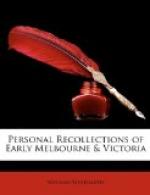THE GERMAN IMMIGRATION.
“Go then forth, and fortune play upon
Thy prosperous helm.”
—2nd part Henry IV.
When I made my first Home trip, in 1847, I resolved to open, if I possibly could, German emigration to Port Phillip. Quite a number had already been settled, some from the earliest years, in South Australia, where their industry, frugality, sobriety, and general good conduct had made them excellent colonists. This favourable testimony was confirmed to me by correspondence on the subject with my late much-lamented friend, Alexander L. Elder, one of South Australia’s earliest, most esteemed, and most successful colonists. My first step on arrival was to write to the “Commissioners of Emigration,” an officiate since dispensed with, pointing out this South Australian success, and suggesting that a certain charge upon the Colonial Land Fund, authorized in special cases of emigrants—an aid of 18 pounds a head, I think—might be made applicable to German vinedressers emigrating to Port Phillip. In due course, I received a most cordial reply from the secretary, Mr. (afterwards Sir) Stephen Walcot, to the effect that Lord Grey, then Colonial Secretary, highly approved of the project, and that the aid asked for would be forthcoming for properly qualified German vinedressers. Armed with this letter, I went to Hamburg with introductions to Messrs. John Caesar Godeffroy and Son, at that time the chief shipowners of the city. They were evidently well disposed, and had been, I think, concerned in the previous out-flow to Adelaide, as they referred me to Mr. Edward Delius, of Bremen, who had been an agent in the work. My visit to Delius resulted in my proceeding at once to Silesia, where I got as far as Liegnitz, whose gilded or tin-covered minarets reminded me that I was approaching the fanciful or gorgeous East. Here I met a number of the peasantry, all eager to hear about Australia, friends of some of them being already there. Hearing that a Moravian headquarters was also there, I introduced myself, stating




